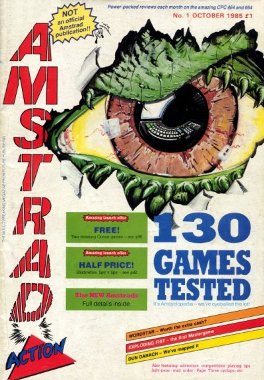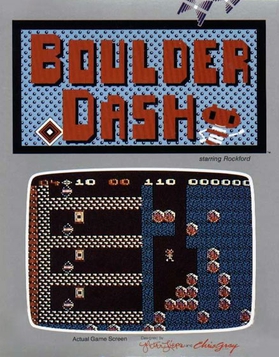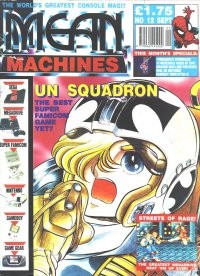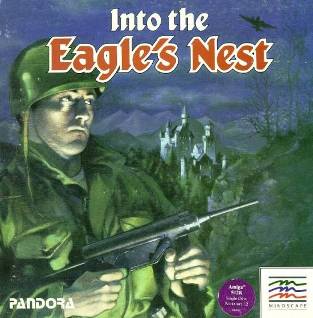
Amstrad Action was a monthly magazine, published in the United Kingdom, which catered to owners of home computers from the Amstrad CPC range and later the GX4000 console.
Andrew Nicholas Oliver and Philip Edward Oliver, together known as the Oliver Twins, are British twin brothers and video game designers.

Boulder Dash is a 2D maze-puzzle video game released in 1984 by First Star Software for Atari 8-bit computers. It was created by Canadian developers Peter Liepa and Chris Gray. The player controls Rockford, who collects treasures while evading hazards.

Krome Studios Melbourne, originally Beam Software, was an Australian video game development studio founded in 1980 by Alfred Milgrom and Naomi Besen and based in Melbourne, Australia. Initially formed to produce books and software to be published by Melbourne House, a company they had established in London in 1977, the studio operated independently from 1987 until 1999, when it was acquired by Infogrames, who changed the name to Infogrames Melbourne House Pty Ltd.. In 2006 the studio was sold to Krome Studios.
Thalamus Ltd was a British computer game developer that published titles for a number of 8-bit and 16-bit platforms during the late 1980s and early 1990s.
Newsfield Publications Ltd was a British magazine publisher during the 1980s and early 1990s.

Zzap!64 was a computer games magazine covering games on the Commodore International series of computers, especially the Commodore 64 (C64). It was published in the UK by Newsfield Publications Ltd and later by Europress Impact.

The One was a video game magazine in the United Kingdom which covered 16-bit home gaming during the late 1980s and early 1990s. It was first published by EMAP in October 1988 and initially covered computer games aimed at the Atari ST, Amiga, and IBM PC compatible markets.

Tynesoft Computer Software was a software developer and publisher in the 1980s and early 1990s.

Mean Machines was a multi-format video game magazine published between 1990 and 1992 in the United Kingdom.

Eutechnyx Limited is a British video game developer based in Newcastle upon Tyne, England. Since 1997, the company has focused on racing games. They are known for their largely panned video game Ride to Hell: Retribution, work with the NASCAR The Game franchise, and as a developer on various other racing titles and games.

RoboCop is a beat 'em up / run and gun video game developed and published by Data East for arcades in 1988 based on the 1987 film of the same name. It was sub-licensed to Data East by Ocean Software, who obtained the rights from Orion Pictures at the script stage. Data East and Ocean Software subsequently adapted the arcade game for home computers.

Fun School is a series of educational packages developed and published in the United Kingdom by Europress Software, initially as Database Educational Software. The original Fun School titles were sold mostly by mail order via off-the-page adverts in the magazines owned by Database Publications. A decision was made to create a new set of programs, call the range Fun School 2, and package them more professionally so they could be sold in computer stores around the UK. Every game comes as a set of three versions, each version set to cater for a specific age range.

Into the Eagle's Nest is a video game developed by Pandora and published for Amiga, Amstrad CPC, Apple II, Atari 8-bit family, Atari ST, Commodore 64, IBM PC, and ZX Spectrum starting in 1987.
The United Kingdom has the largest video game sector in Europe. By revenue, the UK had the second largest video game market in Europe in 2022 after Germany, and the sixth largest globally. By sales, it is Europe's largest market, having overtaken Germany in 2022. The UK video game market was worth £7.16 billion in 2021, a 2% increase over the previous year.

Home computers were a class of microcomputers that entered the market in 1977 and became common during the 1980s. They were marketed to consumers as affordable and accessible computers that, for the first time, were intended for the use of a single, non-technical user. These computers were a distinct market segment that typically cost much less than business, scientific, or engineering-oriented computers of the time, such as those running CP/M or the IBM PC, and were generally less powerful in terms of memory and expandability. However, a home computer often had better graphics and sound than contemporary business computers. Their most common uses were word processing, playing video games, and programming.
The English Software Company, later shortened to English Software, was a Manchester, UK-based video game developer and publisher that operated from 1982 until 1987. Starting with its first release, the horizontally scrolling shooter Airstrike, English Software focused on the Atari 8-bit family of home computers, then later expanded onto other platforms. The company used the slogan "The power of excitement".

P-47: The Phantom Fighter is a 1988 horizontally scrolling shooter arcade video game originally developed by NMK and published by Jaleco. Set during World War II, players control a Republic P-47 Thunderbolt fighter aircraft to face against the Nazis, who are occupying multiple countries around the world. Its gameplay involves destroying waves of enemies, picking up power-ups and new weapons, and destroying bosses. It ran on the Mega System 1 hardware.

Magic Bytes is an international video game publishing label. It originated in Germany as the primary computer game brand of micro-partner Software GmbH, already active since 1986 and dedicated to the internal development of some of the games. Initially, Bertelsmann subsidiary Ariolasoft and Gremlin Graphics in the United Kingdom distributed most Magic Bytes games.














